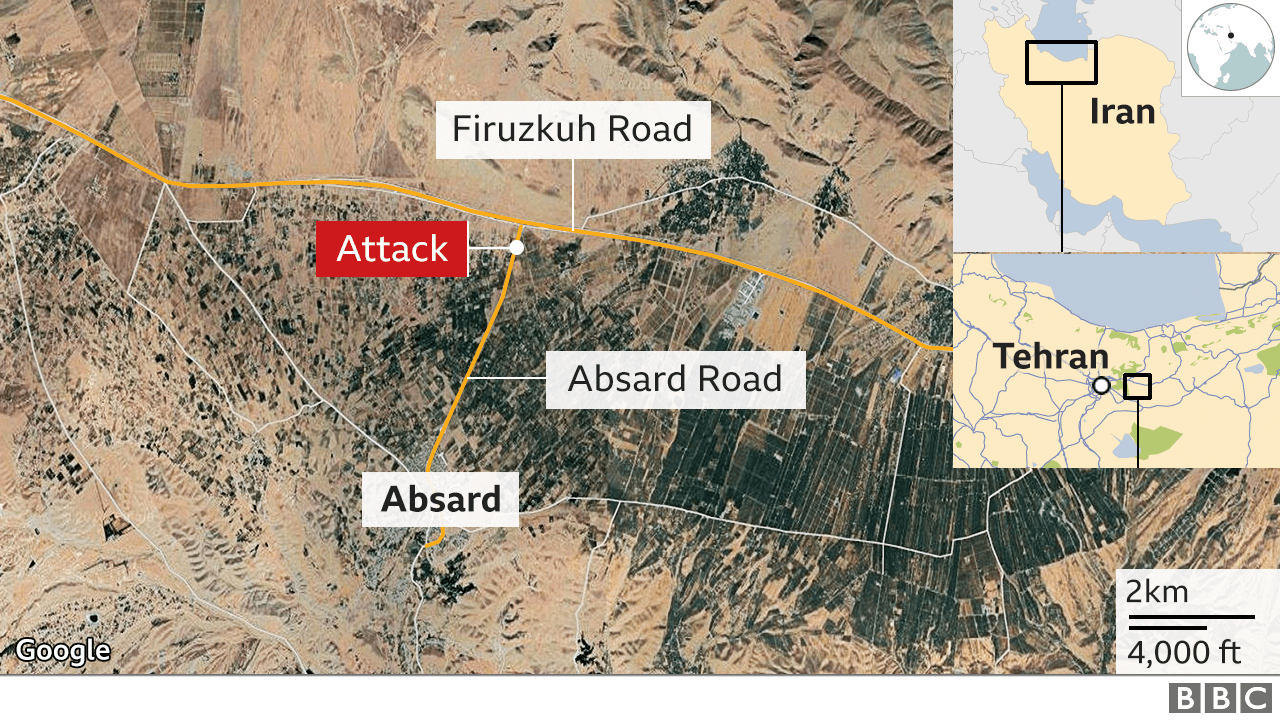 News
News
Iran Accuses Israel Of Assassinating Mohsen Fakhrizadeh, Iran’s Top Scientist
The Iranian president blamed Israel for killing a senior scientist on Friday, saying it would not delay the country’s nuclear program.
Hassan Rouhani also said that Iran would retaliate for the assassination of Mohsen Fakhrizadeh.
Death Of Mohsen Fakhrizadeh
Fakhrizadeh was killed while lying in his car by gunmen in the town of Absard, east of the capital Tehran.
Israel did not comment, but had previously accused him of being behind a secret nuclear program.
Fakhrizadeh was a well-known nuclear scientist in Iran, who led the defense and security services.
His assassination threatens tensions over Iran and the US and Israel.
Iran’s Reaction
President Rouhani said on Saturday his country would respond “in a timely manner” but the assassination of Fakhrizadeh would not force Iran to make hasty decisions.
“Iran’s enemies should know that the Iranian people and officials are more courageous than not allowing this crime to go unanswered,” he said at a Cabinet meeting on television.
“In due course, they will respond to this case,” he added.
In a previous statement, the president accused the “soldiers of the Zionist dictatorship” – referring to Israel – of being the attackers.
“The martyrdom of Fakhrizadeh shows the despair of our enemies and the depth of their hatred … His martyrdom will not delay our success.”
Iran’s Supreme Leader Ayatollah Ali Khamenei also called for the “perpetrators” to be punished “and those who ordered them”, in a tweet on Saturday.
His military adviser, Hossein Dehghan, had earlier promised to “strike” the attackers like thunder.
There were no comments from Israel about the killings. The New York Times quoted three US officials, including two intelligence officials, as saying that Israel was responsible for the attack.
Fakhrizadeh’s name is mentioned specifically in a report by Israeli Prime Minister Benjamin Netanyahu on Iran’s nuclear program in April 2018.
Israeli ambassadors around the world have been on high alert, according to the Israeli news website N12 on Saturday.
Foreign Minister Mohammad Javad Zarif has called on the international community to “condemn this act of terrorism”.
The Background
News of the killings emerges amid new concerns over the increased amount of enriched uranium produced by Iran. Enriched uranium is an important factor in both the production of public power and nuclear weapons in the military.
The 2015 agreement of six states that had imposed restrictions on Iran’s rich uranium production, but since US President Donald Trump abandoned the agreement in 2018, Iran has deliberately renewed its agreements. However, it maintains that its nuclear program is designed only for peaceful purposes.
Joe Biden has promised to meet Iran again when he becomes US president in January, despite long-standing opposition from Israel.
The former head of the US Central Intelligence Agency (CIA), John Brennan, said the scientist’s assassination was a “criminal” and “reckless” act that jeopardized the region’s heated debate.
Global Scenario
In a series of tweets, he said Fakhrizadeh’s death “puts them at risk of deadly retaliation and a new round of regional conflicts”.
Mr Brennan added that he did not know “whether the foreign government had authorized or condoned Fakhrizadeh’s assassination”.
UN Secretary-General António Guterres has called for restraint, and on Saturday a spokesman for Germany’s foreign ministry urged all parties “to refrain from any action that could lead to another situation.”
“A few weeks before the new US regime takes office, it is important to keep the negotiations with Iran so that the Iranian nuclear program dispute is resolved through negotiations,” the statement said.
These are important weeks – counting down to January 20 when President-elect Biden takes office on a new route to Iran, including the expectation of a return to the 2015 nuclear deal.
The assassination follows a secret meeting last week in Saudi Arabia between the Saudi foreign minister and the Israeli prime minister – officially rejected by the state. It sent another signal that Prince Crown Mohammed bin Salman and Benjamin Netanyahu saw this window as their best temporary opportunity to try to strike a blow to their arch-enemy Iran – the pain of resuming an already challenging course The US team will rejoin the Islamic Republic.
All sides know that it is also a moment full of danger. Iranian President Rouhani says Iran is “too smart to fall into the trap of Israel”.
Revenge right now is threatening the biggest answer, and it has landed the biggest problem that could jeopardize any chance of a fresh start in January.
Killing Of The Scientist
Iran’s defense ministry said a leading scientist was critically injured after gunmen stormed his car and shot at his bodyguards in the town of Absard, east of Tehran, on Friday.

Fakhrizadeh later died of his injuries at the hospital.
It is unclear what happened to those who carried out the attack.
Fakhrizadeh has long been hailed by Western security sources as a major power and contributor to Iran’s nuclear program.
Is There Any Israeli Involvement?
According to secret documents obtained by Israelis in 2018, he led a program to build nuclear weapons.
At that time Israeli Prime Minister Benjamin Netanyahu said he identified Fakhrizadeh as the lead scientist in the program, and urged people to “remember that name”.
In 2015, The New York Times likened him to J Robert Oppenheimer, a philosopher who directed the Manhattan Project that during World War II released the first atomic weapons.
Professor of physics, Fakhrizadeh, is said to have spearheaded Project Amad, a suspected secret program launched in 1989 to study the power of the nuclear bomb.
It was closed in 2003, according to the International Atomic Energy Agency (IAEA), although Mr Netanyahu said the documents received in 2018 show that Fakhrizadeh led the project which continued the work of Project Amad in private.
The IAEA (United Nations Nuclear Organization) has long sought to speak to him as part of its investigation into Iran’s nuclear program.
Allegations that Iran was using the program as a cover to develop a nuclear bomb prompted the EU, US and UN to impose a crippling sanction in 2010.
Since President Trump left the 2015 agreement, tensions between the US and Iran have escalated, escalating in January with the assassination of US General Gen Qasem Soleimani, commander of the Iranian Revolutionary Guards’ Quds.
Recent Posts
- Feeling the Pressure at 25–30? Here’s Why Young Adults Think Time Is Running Out
- BTS Is Back! All Seven Members Complete Military Service—What’s Next for the K-Pop Kings?
- Diddy’s Blockbuster Trial Nears Verdict: What’s Next for the Hip-Hop Mogul?
- “Squid Game” Final Season Sparks Global Buzz Ahead of Premiere
- Beyoncé and Jay-Z Reunite Onstage in Paris: A Night to Remember
- Texas Bets Big on Film: $1.5 Billion Incentive Law Aims to Bring Hollywood Home
- Starbucks Considers Selling Its China Business Amid Fierce Local Competition
- JetBlue Retreats from Miami and Seattle Amid Mounting Financial Pressures
- Barbra Streisand Calls Out Hollywood’s Pay Gap in Meet the Fockers Revelation
- Elon Musk’s Robotaxi Revolution: A Cosmic Ride into the Future


